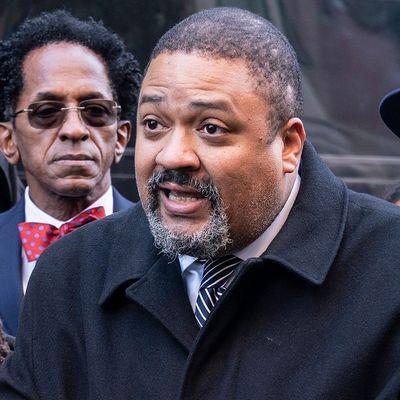
Meet the new boss, very different from the old boss.
The new Manhattan district attorney, Alvin Bragg, issued a set of guidelines to prosecutors on Tuesday that show he is serious about enacting the criminal-justice reforms he campaigned on.
In a lengthy memo, Bragg, who replaced fellow Democrat Cyrus Vance Jr., said his office will stop prosecuting a spate of lower-level offenses, including prostitution, resisting arrest, fare evasion, and traffic offenses that don’t accompany a felony. Bragg advised that bail should not be sought except in certain cases, nor will prosecutors seek a “carceral sentence” except for deadly or violent crimes, domestic-violence felonies, various sex offenses, public corruption, racketeering, or serious financial crimes. He also wrote that the maximum sentence his office would recommend is 20 years, absent unnamed “exceptional cirumstances.” This would be a return to an earlier era in American criminal justice, when ironclad life sentences were far rarer.
At the beginning of the memo, Bragg wrote of his many interactions with the criminal-justice system growing up in Harlem and as an adult. “In large part because of these experiences,” he wrote, “I have dedicated my career to the inextricably linked goals of safety and fairness,” and “data, and my personal experiences, show that reserving incarceration for matters involving significant harm will make us safer.”
Bragg’s reforms are in line with a wave of left-leaning district attorneys elected in major cities over the past few years, from Philadelphia’s Larry Krasner to San Francisco’s Chesa Boudin. Swept into office on a wave of backlash to America’s harsh criminal-justice system, several of these reformers are now experiencing a backlash themselves, with crime rates soaring in many (though not all) cities around the country since the pandemic. The correlation between more lenient criminal-justice policies and worse crime outcomes is extremely fuzzy, but that has not deterred critics who point to bail reform and other such policies as a license to anarchy.
The New York Post gave Bragg a taste of the resistance he’ll be facing, declaring in an editorial that the city should “brace for a lot more crime in Manhattan.” Paul DiGiacomo, head of the NYPD Detectives’ Endowment Association, said that Bragg is “emboldening the criminal element to resist arrest and put New York City police officers and detectives in harm’s way,” though Patrick Lynch, the president of the Police Benevolent Association, took a softer tone.
Mayor Eric Adams, who campaigned on a platform that was both pro-police and pro-reform and who has stumped with Bragg, appeared to give him the benefit of the doubt, for now. “I have a lot of respect for DA Bragg, a former prosecutor,” Adams said on Tuesday. “He has a real vision.”






























